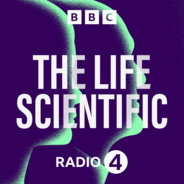Lucie Green studies the sun - that giant, turbulent ball of burning gas at the centre of our solar system. Her first ambition was to become an art therapist, but she soon switched from art to astrophysics, and before long had fixed her gaze on our local star. It may be 93 million miles away, but the sun's extensive and ever changing magnetic field determines the 'weather' throughout our solar system. Under a worst-case scenario, bubbles of super-hot plasma and streams of high energy particles - spat out when the surface of the sun erupts - can hurtle towards planet earth, damaging communication and navigation satellites and bringing down electrical power supplies.Thanks to the work that Lucie and others have done to raise awareness of these coronal mass ejections, solar belches as Lucie likes to call them are now a recognised threat to national security, alongside flooding, pandemic flu and terrorist attacks. Producer: Anna Buckley.

Wissenschaft & Technik
The Life Scientific Folgen
Professor Jim Al-Khalili talks to leading scientists about their life and work, finding out what inspires and motivates them and asking what their discoveries might do for us in the future
Folgen von The Life Scientific
348 Folgen
-
Folge vom 03.10.2017Lucie Green on the sun
-
Folge vom 26.09.2017Tracey Rogers on leopard seals and AntarcticaMarine ecologist Tracey Rogers talks to Jim Al Khalili about her research on one of Antarctica's top predators. This is the leopard seal - a ten foot long killer which glides among the ice floes in search of prey ranging from other seals to penguins to tiny krill. Tracey's research has encompassed the animal's prolific and eerie underwater singing to radical changes in its diet that appear to be linked to climate change.Now a senior researcher at the University of New South Wales in Australia, Tracey first encountered the species as a less than successful seal trainer at a zoo in Sydney. There she met a giant female leopard seal named Astrid. Astrid's singing one Christmas day in the early 1990s set Tracey on the path to become the world's authority on this Antarctic species.Tracey tells Jim how her first expedition to study leopard seals was met with almost universal scepticism until she dropped an underwater microphone into the water. In the following 25 years, she has worked to decode the meanings and qualities of the leopard seal song and explored the changes being forced upon the species by climate change. Tracey describes what made her return to Antarctica again and again and tells the story of how she almost met her end in the perilous shifting world of the pack ice. And then there's the time a leopard seal mistook her for a penguin. There is a longer version of this interview in the podcast of this episode - more on the seal vocalisations and how Tracey saved the life on a young colleague who fell into the freezing sea. Producer: Andrew Luck-Baker.
-
Folge vom 19.09.2017Jennifer DoudnaJennifer Doudna's research has transformed biology. And this is not an understatement. Her work has given us the tools to edit genes more precisely than ever before. Her scientific career began with work to understand the actions of RNA, part of the machinery of every cell. But, after a meeting in 2005 with a colleague at the University of California, Berkeley, where Jennifer is currently a professor of chemistry and of molecular and cell biology, she changed her direction of research. Through collaborations all over the world she's since developed the gene editing system called CRISPR/cas9. She's been awarded multiple prizes for her work. The CRISPR/cas9 system has created opportunities that could be used for both for good and for ill. Unlike many scientists who leave the ethical implications of their research to others, Jennifer Doudna has decided to engage with her critics. She talks to Jim al-Khalili about her decision to do this.
-
Folge vom 30.05.2017Tamsin Mather on what volcanic plumes reveal about our planetTo volcanologist Tamsin Mather, volcanoes are more than a natural hazard. They are 'nature's factories', belching out a rich chemical cocktail of gases. It's these gases or 'plumes' that fascinate her the most. She likes nothing more than crouching on a crater's edge collecting a smouldering mix of ash and gases, a clue to what's brewing deep inside.As Professor of Earth Sciences at Oxford University, her work is helping to not only predict when a volcano may erupt, but to understand how volcanoes shape our planet both now and over geological time.Producer: Beth Eastwood.
